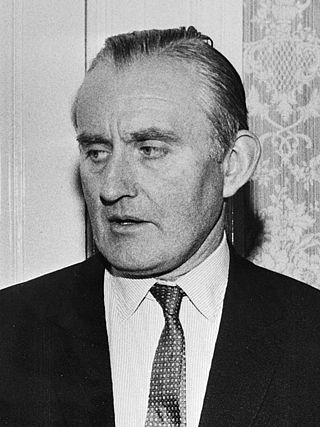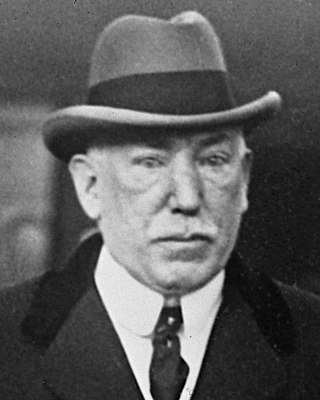
The prime minister of Northern Ireland was the head of the Government of Northern Ireland between 1921 and 1972. No such office was provided for in the Government of Ireland Act 1920; however, the Lord Lieutenant of Ireland, as with governors-general in other Westminster systems such as in Canada, chose to appoint someone to head the executive even though no such post existed in statute law. The office-holder assumed the title prime minister to draw parallels with the prime minister of the United Kingdom. On the advice of the new prime minister, the lord lieutenant then created the Department of the Prime Minister. The office of Prime Minister of Northern Ireland was suspended in 1972 and then abolished in 1973, along with the contemporary government, when direct rule of Northern Ireland was transferred to London.

James Dawson Chichester-Clark, Baron Moyola, PC, DL was the penultimate Prime Minister of Northern Ireland and eighth leader of the Ulster Unionist Party between 1969 and March 1971. He was Member of the Northern Ireland Parliament for South Londonderry for 12 years, beginning at the by-election to replace his grandmother, Dame Dehra Parker in 1960. He stopped being an MP when the Stormont Parliament was suspended and subsequently abolished with the introduction of Direct Rule by the British Government.
The Comptroller of the Household is an ancient position in the British royal household, nominally the second-ranking member of the Lord Steward's department after the Treasurer of the Household. The Comptroller was an ex officio member of the Board of Green Cloth, until that body was abolished in the reform of local government licensing in 2004. In recent times, a senior government whip has invariably occupied the office. On state occasions the Comptroller carries a white staff of office, as often seen in portraits.

Sir Charles Norman Lockhart Stronge, 8th Baronet, MC, PC, JP was a senior Ulster Unionist Party politician in Northern Ireland.
The Assistant Postmaster General is a defunct junior ministerial position in the United Kingdom Government.

The Parliament of Northern Ireland was the home rule legislature created under the Government of Ireland Act 1920, which existed from 7 June 1921 to 30 March 1972, when it was suspended. It was subsequently abolished under the Northern Ireland Constitution Act 1973.
The Minister of Home Affairs was a member of the Executive Committee of the Privy Council of Northern Ireland (Cabinet) in the Parliament of Northern Ireland which governed Northern Ireland from 1921 to 1972. The Minister of Home Affairs was responsible for a range of non-economic domestic matters, although for a few months in 1953 the office was combined with that of the Minister of Finance.

Lisnaskea was a constituency of the Parliament of Northern Ireland. It was located in County Fermanagh and included the namesake town of Lisnaskea.
The Minister of Agriculture was a member of the Executive Committee of the Privy Council of Northern Ireland (Cabinet) in the Parliament of Northern Ireland which governed Northern Ireland from 1921 to 1972. The post was combined with that of the Minister of Commerce until 1925, and was later vacant for three short periods.
The Minister of Commerce was a member of the Executive Committee of the Privy Council of Northern Ireland (Cabinet) in the Parliament of Northern Ireland which governed Northern Ireland from 1921 to 1972. The post was combined with that of the Minister of Agriculture until 1925. In 1943, it was renamed Minister of Commerce and Production and was combined with the post of Prime Minister of Northern Ireland until 1945, then with Leader of the Senate of Northern Ireland until 1949.
The Minister of Health and Local Government was a member of the Executive Committee of the Privy Council of Northern Ireland (Cabinet) in the Parliament of Northern Ireland which governed Northern Ireland from 1922 to 1972. The post was created in 1944 and was renamed Minister of Health and Social Services in 1965.

The High Sheriff of Belfast is a title and position which was created in 1900 under the Local Government (Ireland) Act 1898, with Sir James Henderson the first holder. Like other high sheriff positions, it is largely a ceremonial post today. The current high sheriff is Councillor Sammy Douglas, who took office in 2024.
This is a list of people who served as Chief Whip of the Ulster Unionist Party in the Parliament of the United Kingdom, the Parliament of Northern Ireland and the Northern Ireland Assembly.
Sir Alexander Wilson Hungerford, known as Wilson Hungerford, was a Unionist politician in Northern Ireland.
The High Sheriff of County Londonderry is King Charles III's judicial representative in County Londonderry. Initially an office for lifetime, assigned by the ruling monarch, the High Sheriff became annually appointed from the Provisions of Oxford in 1258. Besides his judicial importance, he has ceremonial and administrative functions and executes High Court Writs.






